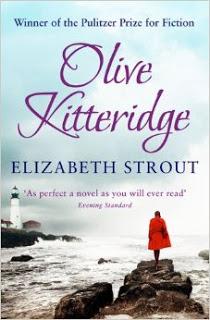
Published 25 March 2008.
Olive Kitteridge is greater than the sum of its parts.For this reason, I struggle to fully explain my response to this intriguing novel, presented as a collection of 13 interconnected short stories.
I can gesture to some of the novel's strengths: the structure is ornate yet easy to read, the setting of Crosby, Maine well supports many of the themes, the characters are at once odd and recognizable, and the treatment of aging is complex.
Notably, Olive Kitteridge (2008) by Elizabeth Strout was awarded the 2009 Pulitzer Prize for Fiction.
Also, HBO aired its award-winning mini-series, Olive Kitteridge, based on the novel and starring Frances McDormand as the title character.
It took me seven years to finally answer the question "Why all the fuss?" for myself. I thoroughly enjoyed reading this book.
Strout makes every detail count.The deeper I got into the collection, the more slowly I began to read. Every character makes an important contribution. Each line of dialog reveals key facts or valuable perspective. Objects and settings that seem mundane end up revealing important insights.
Bankers, waitresses, school counselors, pharmacists, pianists, podiatrists and many other residents of Crosby, Maine go about their daily lives traveling between work, home, the local stores, the town churches and the local bars. Every body is getting by and offering support to each other.
On closer look, the average citizen is shouldering exceptional challenges. Some are clinically depressed, others have arrest records, some have been institutionalized in prisons, psychiatric wards, or nursing homes. Many are wrestling to find a way to manage tension-filled relationships with parents, spouses, children or neighbors.
Life is not a bowl of cherries.
Olive herself appears cast as a minor character, if not just an extra whose main role is atmospheric. She tosses off no-nonsense commentary on these life hardships that startle the townspeople, except that they are fairly used to her brash ways. Is she a symbol for the plain, practical, harsh Yankee pragmatism of New England? A foil to the glamorous and polished women on prime time television?
If Olive weren't the title character, I would have too easily dismissed and devalued her. Instead, I focused on her and gave her the benefit of the doubt. This bore great fruit and encourages me to pay more attention to people in my life whom I might mistakenly cast as "atmospheric extras."
Olive is middle aged moving into late life in these stories. She's dowdy, harsh, blunt, and unremarkable. She is antithetical to the female role models that dominate popular culture. Yet by the last short story, I found a great admiration--if not love--for Olive. She's actually Every Woman: trying to survive despite surviving childhood traumas, midlife compromises, and late-life disappointments.
By reading through some of the member reviews on Goodreads, I see that many readers find the book dark and depressing. I disagree. I find hope in watching Olive and many of her fellow townspeople responding to very difficult life challenges. Most people resist talking about taboo topics such as mental illness, suicide, and infidelity. However, families all-too-often must negotiate through such tragedies in order to thrive if not merely survive--which proves heroic enough if privy to the details.
And Strout makes us privy to the details. She's masterful in revealing a great deal about her characters inner lives while also describing in detail their exterior lives.
While this novel is about much more than aging, Olive Kitteridge does address age-related challenges. In order to avoid spoilers, let me just say that Strout uses flashbacks and characters review key details from their past in order to reconcile their life dreams with the harsh realities of their lives. Nevertheless, midlife characters and older character learn to compromise, to victories on the small scale, to take comfort where they can find it, and in other ways move past disappointment.
The books virtues are quiet, subtle, complex, and rich. For me, the book mimics the cranky old man or the brusk old women I might see in the grocery store. It's all too easy for me to dismiss them. However, if I listen to their life stories, I can find gems and joys amid the detail. Strout's novel-as-stories revealed itself similarly. I recommend taking the time to look past its brusque and grouchy exterior.
Related:
Books on Aging
Novels about Ripeness
Books on Aging and Spiritual Growth

